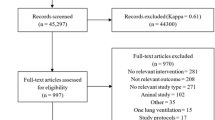Abstract
Background
Hyperbaric oxygen (HBO) therapy is a controversial treatment for adhesive postoperative small bowel obstruction (ASBO), with only a few retrospective studies reported. The aim of this study was to assess the clinical impact of HBO therapy in the treatment of ASBO.
Methods
Patients with ASBO were randomly assigned to no-HBO (standard arm) or HBO (intervention arm). Patients of the intervention arm were treated once daily at a pressure of 2.0 atm absolute and received 100% oxygen. The primary endpoint was the success rate of medical treatment. This study was registered at the UMIN Clinical Trial Registry as UMIN000010399.
Results
The no-HBO group included 40 patients, and the HBO group included 33 patients. Patient characteristics, time to oral intake, and length of hospital stay were similar between the two groups. No significant differences were noted between the no-HBO and HBO groups in the need for long intestinal tube decompression (20.0 versus 18.2%, respectively, p = 1.000) and the need for operative intervention (10.0 versus 18.2%, respectively, p = 0.332). The overall success rate of medical treatment was 72.5% in the no-HBO group and 78.8% in the HBO group (p = 0.594).
Conclusions
In this randomized controlled trial, HBO for ASBO has no additional effect in medical treatment.

Similar content being viewed by others
References
Seror D, Feigin E, Szold A, Allweis TM, Carmon M, Nissan S, Freund HR (1993) How conservatively can postoperative small bowel obstruction be treated? Am J Surg 165:121–125
Cox MR, Gunn IF, Eastman MC, Hunt RF, Heinz AW (1993) The operative aetiology and types of adhesions causing small bowel obstruction. Aust N Z J Surg 63:848–852
Matter I, Khalemsky L, Abrahamson J, Nash E, Sabo E, Eldar S (1997) Does the index operation influence the course and outcome of adhesive intestinal obstruction? Eur J Surg 163:767–772
Bueno-Lledó J, Barber S, Vaqué J, Frasson M, Garcia-Granero E, Juan-Burgueño M (2016) Adhesive small bowel obstruction: predictive factors of lack of response in conservative management with gastrografin. Dig Surg 33:26–32
Farid M, Fikry A, El Nakeeb A, Fouda E, Elmetwally T, Yousef M et al (2010) Clinical impacts of oral gastrografin follow-through in adhesive small bowel obstruction (SBO). J Surg Res 162:170–176
Fukami Y, Kurumiya Y, Mizuno K, Sekoguchi E, Kobayashi S (2014) Clinical effect of hyperbaric oxygen therapy in adhesive postoperative small bowel obstruction. Br J Surg 101:433–437
Choi HK, Chu KW, Law WL (2002) Therapeutic value of gastrografin in adhesive small bowel obstruction after unsuccessful conservative treatment: a prospective randomized trial. Ann Surg 236:1–6
Biondo S, Parés D, Mora L, Martí Ragué J, Kreisler E, Jaurrieta E (2003) Randomized clinical study of gastrografin administration in patients with adhesive small bowel obstruction. Br J Surg 90:542–546
Williams SB, Greenspon J, Young HA, Orkin BA (2005) Small bowel obstruction: conservative vs. surgical management. Dis Colon Rectum 48:1140–1146
Ji ZL, Li JS, Yuan CW, Chen WD, Zhang YN, Ju XT, Tang WH (2010) Therapeutic value of sesame oil in the treatment of adhesive small bowel obstruction. Am J Surg 199:160–165
Fleshner PR, Siegman MG, Slater GI, Brolin RE, Chandler JC, Aufses AH Jr (1995) A prospective, randomized trial of short versus long tubes in adhesive small-bowel obstruction. Am J Surg 170:366–370
Tibbles PM, Edelsberg JS (1996) Hyperbaric-oxygen therapy. N Engl J Med 334:1642–1648
Leach RM, Rees PJ, Wilmshurst P (1998) Hyperbaric oxygen therapy. Br Med J 317:1140–1143
Akin ML, Uluutku H, Erenoglu C, Ilicak EN, Elbuken E, Erdemoglu A, Celenk T (2002) Hyperbaric oxygen ameliorates bacterial translocation in rats with mechanical intestinal obstruction. Dis Colon Rectum 45:967–972
Chen MJ, Chen TY, Cheng YM, Hsu YC (2012) The effect of postoperative hyperbaric oxygen treatment on intra-abdominal adhesions in rats. Int J Mol Sci 13:12224–12231
Ohno Y, Kanematsu T (1998) Hyperbaric oxygen therapy for intestinal obstruction in children: an exceptional experience in a compromised child. J Pediatr Surg 33:1543–1545
Ambiru S, Furuyama N, Kimura F, Shimizu H, Yoshidome H, Miyazaki M, Ochiai T (2008) Effect of hyperbaric oxygen therapy on patients with adhesive intestinal obstruction associated with abdominal surgery who have failed to respond to more than 7 days of conservative treatment. Hepatogastroenterology 55:491–495
Knighton DR, Halliday B, Hunt TK (1986) Oxygen as an antibiotic. A comparison of the effects of inspired oxygen concentration and antibiotic administration on in vivo bacterial clearance. Arch Surg 121:191–195
Abu-Asi MJ, Andreyev HJ (2013) The utility of hyperbaric oxygen therapy to treat recurrent acute bowel obstruction after previous pelvic radiotherapy: a case series. Support Care Cancer 21:1797–1800
West JB (1999) The original presentation of Boyle’s law. J Appl Physiol 87:1543–1545
Author information
Authors and Affiliations
Corresponding author
Ethics declarations
Conflict of interest
The authors declare that they have no conflict of interest.
Ethical approval
This trial was approved by the Institutional Review Board. This study was registered at the UMIN Clinical Trial Registry as UMIN000010399.
Informed consent
Informed consent was obtained from all individual participants included in the study.
Additional information
Highlight
Hyperbaric oxygen (HBO) therapy is a controversial treatment for adhesive postoperative small bowel obstruction (ASBO), with only a few small studies reported. In this RCT, HBO for ASBO has no additional effect in conservative treatment.
This paper is not based on previous communications with a society or meeting.
Rights and permissions
About this article
Cite this article
Fukami, Y., Kobayashi, S., Sekoguchi, E. et al. Randomized controlled trial of hyperbaric oxygen therapy in adhesive postoperative small bowel obstruction. Langenbecks Arch Surg 403, 555–559 (2018). https://doi.org/10.1007/s00423-018-1682-1
Received:
Accepted:
Published:
Issue Date:
DOI: https://doi.org/10.1007/s00423-018-1682-1




